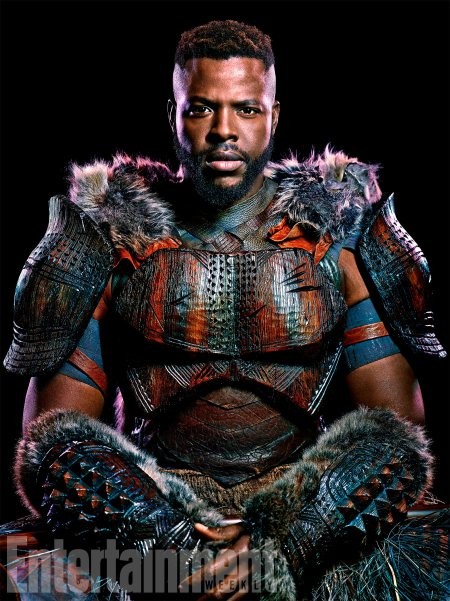How 'Black Panther' Changed One Of Its Villains To Avoid Racist Stereotypes
Early comics history is rife with uncomfortable stereotypes, and Marvel's Black Panther — the first black superhero in American comics — was no exception. One character that aged poorly is Man-Ape, an iconic Black Panther villain who wears a suit styled like a white gorilla.
Given the massive responsibility of bringing Black Panther to the big screen, director Ryan Coogler and the film's producers had to navigate the minefield of Man-Ape's complicated implications, given the history of racists comparing black people to apes.
Man-Ape first appeared in Avengers #62 in March 1969 as M'Baku, a leader of Wakanda's outlaw White Gorilla Cult who want to usurp the throne and return Wakanda to a primitive state. The anti-technology group worships the Wakandan Gorilla deity, and are just one of many religious factions that style themselves after gods loosely based in Egyptian mythology. Similar to how the royal family gain enhanced abilities by consuming the Black Panther sacred heart-shaped herb, the White Gorilla followers gain their powers of extreme strength by consuming the flesh and bathing in the blood of the endangered White Gorilla.
The Black Panther producers saw potential in this character's ideologies, and the narrative value of the warring religious factions vying for power in Wakanda. But first they had to deal with that problematic name and costume.
Black Panther executive producer Nate Moore told Entertainment Weekly that their first step in depicting Man-Ape on the big screen was to drop the codename.
"We don't call him Man-Ape. We do call him M'Baku. Having a black character dress up as an ape, I think there's a lot of racial implications that don't sit well, if done wrong. But the idea that they worship the gorilla gods is interesting because it's a movie about the Black Panther who, himself, is a sort of deity in his own right."
Moore explained how M'Baku (Winston Duke) is the head of a religious minority in Wakanda who butts heads with T'Challa (Chadwick Boseman), and previously the late king T'Chaka, over the role Wakanda should play in the world. "In M'Baku's worldview, T'Chaka made a huge mistake going to the U.N.," Moore said. "'We should never engage with the outside world. That's a terrible mistake. And if his son is anything like his father, I don't support him being on the throne.'"
As for the costume, the crew took a less literal interpretation of the White Gorilla. M'Baku wears fur on his arms and legs, and has a chestplate adorned with symbols of his tribe. Most importantly, he no longer wears the full gorilla mask.
Coogler and Moore's inspired re-imagining of M'Baku proves that it is possible for Marvel to change racist or stereotypical characters without taking away their culture completely (I'm looking at you with the Ancient One, Doctor Strange). Whitewashing, or erasing a character completely, doesn't have to be the norm when it comes to problematic characters. And by re-imagining a character like this, Coogler and his team have so much more rich content and story to play with. I hope that Marvel takes note, and gives projects with troubling depictions of minority characters to people who can give appropriate respect to the culture by which they're inspired.
Black Panther hits theaters February 16, 2018.

